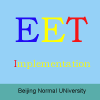-
Evaluating Online Resources
普通类 -
- 支持
- 批判
- 提问
- 解释
- 补充
- 删除
-
-
Evaluating Online Resources
DUE TO THE ABUNDANCE OF online resources and information now available, determining the credibility of Web content is no longer a luxury but a necessity. Even established sites may contain invalid or preliminary findings.
Users should use critical thinking skills when viewing information online. This article provides guidelines and factors to consider when evaluating the multitude of online resources.-
Overall Guidelines
Numerous university libraries, like those at Harvard and the University of California, have developed guidelines for evaluating online resources (Gants, 1999). These guidelines include essential questions you'll want to ask when viewing resources online as illustrated in the table below (based on Colhoun, 2000; Gants, 1999; Goldsborough, 1999; Poftak & McKenzie, 2001; Powell, 2002; Roka, 2000.):
Consider Questions to Ask...
Sponsorship • Is it a well-known, reputable organization?
• Are they experts in the field of study?
• Is an e-mail address provided?
Author • Are the author's credentials disclosed?
• The author's affiliation to the organization?
• Is author's contact information provided?
Mission Statement •Is mission statement clearly stated?
• Is mission statement easy to find?Source of Information • Are sources properly documented?
• Are sources verifiable?
• Sources based on known researchers?
• Are peer-reviewed journals used?
• Is there a list of references provided?Content • Is it a balanced perspective?
• Is the information bias or based on facts?
• Are there any grammatical errors?
• Is it written in a professional format?
• Is the content kept updated?
• Any corrections made to information?
Links • Are the links operational?
• Are there links to other sources?
• Are the links kept current?
• Is there a link to the mission statement?
Navigation •Is the pertinent information easy to find?
• Does advertising detract from viewing?
• Is there an index to the site?-
What Research Shows
The Web Credibility Project conducted at Stanford University considered factors like expertise, author credentials, sponsorship, and informational updates in determining the validity of information on the Web (Powell, 2002). The findings showed that "typos, broken links, a Web counter showing only a few thousand hits, and text that's too small (Anthes, 2002, p. 26)" had a negative impact on the credibility of a site. Web resources that were rated as having a higher level of credibility by U.S. users provided information regarding the privacy policy and the author's qualifications. To determine the credibility of online resources, users also looked at the breadth of information provided, how consistently the Web content was updated, and the availability of contact information for both the sponsorship and the Web author (Powell, 2002).-
The "Four A" Principle
Yahooligan.com developed a checklist for Web users referred to as the "Four A" principle (Colhoun, 2000). This principle can be used to evaluate a Web site and the four A's are accessibility, accuracy, appropriateness, and appeal. These four categories are further defined as follows:
Accessibility refers to the ease of navigation, how quickly the site loads, and an explanation of the browser requirements.
Accuracy refers to identification of the information sources, citation and documentation of sources used, and the timeliness of the information.
Appropriateness refers to the relevance of site content to the intended audience and clarity of the site's content.
Appeal refers to the site design and its enhancement of the information provided within the site.-
A Final Note
In addition to practicing the guidelines noted above, users should try to verify information found on the Web with at least two other sources. This practice is what librarians and scientists refer to as the "principle of triangulation of data (Goldsborough, 1999)." Making the effort to verify online resources is to your benefit, and when you find credible online information be sure to bookmark it and return on occasion to make certain that the links are still functional and the information is kept up-to-date.-
For Additional Information
See http://www.consumerwebwatch.com, for guidelines, resources, and research regarding the credibility of information on the Web.
See http://infodome.sdsu.edu/research/evaluate/evaluate.shtml, for criteria on evaluating information and links to other relevant sources regarding the topic.
See http://lib.nmsu.edu/instruction/evalcrit.html, for additional evaluation criteria to be used with online resources.
See a book titled: Multimedia Storytimes by Robin Works Davis, for a Web site evaluation form to be used in schools.-
Author
Kimberly Vogel
SDSU Educational Technology -
-
- 标签:
- site
- sources
- web
- author
- online
- resources
- guidelines
- evaluating
- information
- links
- credibility
-
加入的知识群:



学习元评论 (0条)
聪明如你,不妨在这 发表你的看法与心得 ~